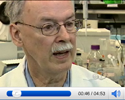

An employee previously noticed the double doors on Building 50's fourth floor closed too quickly and forcefully, but didn't mention it to anyone. Then, when he recently tried to walk through with both hands full, the door banged his forearm. There was no injury, but the close call prompted him to report the hazard and it was fixed quickly. Later, others reported that they too had noticed the problem with the door, but didn’t speak up. The lesson? If you ID a malfunction or have a near-hit, report it — it could help keep others from getting hurt.
 Research: Shedding Light on Diatoms' Diversity, Carbon Trapping Success
Research: Shedding Light on Diatoms' Diversity, Carbon Trapping SuccessDiatoms, mighty microscopic algae, have profound influence on climate, producing 20 percent of the oxygen we breathe by capturing atmospheric carbon and in so doing, countering the greenhouse effect. Since their evolutionary origins these photosynthetic wonders have come to acquire advantageous genes from bacterial, animal and plant ancestors enabling them to thrive in today’s oceans, according to research by the Joint Genome Institute. More>
 In The News: Synthetic Biology Inches Toward the Mainstream
In The News: Synthetic Biology Inches Toward the Mainstream[CNN] As bioengineers continue to build things with the stuff of life itself, the rest of the world is slowly waking up to the power of synthetic biology. While students tinker away in labs making bacteria turn red or green, commercial enterprises are already working towards potentially revolutionary projects. Amyris Biotechnologies, founded by Berkeley Lab physical bioscientist Jay Keasling, is developing a more affordable, accessible cure for malaria. More>
 In The News: How Does Solar Power Work? Alivisatos Explains
In The News: How Does Solar Power Work? Alivisatos Explains[Scientific American] The sun—that power plant in the sky—bathes Earth in ample energy to fulfill all the world's power needs many times over. It doesn't give off carbon dioxide emissions. It won't run out. And it's free. So how on Earth can people turn this bounty of sunbeams into useful electricity? We asked Paul Alivisatos, deputy director of Berkeley Lab, to explain how people capture energy from sunlight and how we can do it better. More>
 In The News: Responsibly Creating New Plant Biofuels
In The News: Responsibly Creating New Plant Biofuels[KGO TV] Inside the Energy Biosciences Institute, scientists are working towards tomorrow's alternative to gasoline. However, instead of pumping fossil fuels out of the earth, they hope to grow a solution. "The precedence is ethanol, although in the future we think we are going to be able to make fuels that look more like diesel and gasoline," says EBI head Chris Somerville. ![]()
 People: Physical Bioscientist to be Honored as ‘Rising Star’
People: Physical Bioscientist to be Honored as ‘Rising Star’ As part of the Pantheon Ceremony on Nov. 13, Berkeley Lab’s Michelle Chang will receive the “2008 Rising Star” award. The event hosted by Bay Bio, a trade association serving the life science industry in Northern California. Chang works in the Physical Biosciences Division developing basic tools for engineering organisms that can perform all kinds of reactions that are too difficult, expensive, or dangerous with traditional chemistry. More>
Berkeley Lab is strengthening the control of documents that are important to its operations. Institutional policy has been revised to facilitate proper identification, review, and distribution of vital documents. This policy and additional guidance may be found in the Regulations and Procedures Manual (RPM), Section 5.08, and the Operating and Quality Management Plan (PUB-3111), Section 2.7. More>